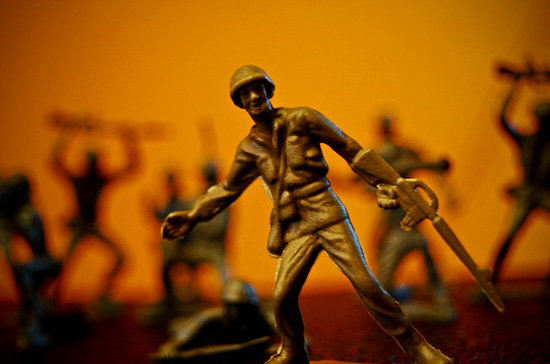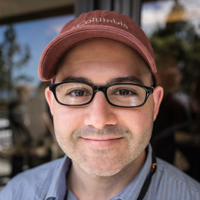In 1984—when they told us that the Soviets boycotting the Olympics in Los Angeles wasn’t such a big deal, really—Marvel Comics published Secret Wars. It was such an amazing comic book series… nothing like it had ever been done before. Heroes and villains from dozens of separate titles all duking it out together over the course of a year.
To my hungry, nine-year-old eyes, it was hard to tell who the heroes were because sometimes they turned out to be the villains. And some of the villains were really just misunderstood heroes. To me, it was the very peak of drama. Every panel was like a movie, each issue an epic.
What I didn’t understand at the time was the series’ political parallels: Ronald Reagan was running a secret war of his own, quietly selling arms to Iran to fund rebel forces in Nicaragua.
So I devoured each issue like an addict, flipping the pages at a staccato pace. And my addiction spread quickly—Secret Wars made me a comics fan for over a decade. And as I grew up, it lead me to bigger (and better) stories.
Stories like these three, which are about the real secret wars. They’re the dark battles that remain unspoken, lurking on the fringes and hiding in plain sight. They’re the conspiracies of silence caused by the things we can’t say.
Those are wars, too. We wage them with the people closest to us, but never admit to their existence… or to the damage they cause.
The things that hurt us the most are the ones we can’t speak of. They pull at us in the smallest, the most intimate of ways. They break us with their banality. Or sometimes they just break us.
Here are three stories from the front.
Act One: The Bathroom

Back in 2005—when the government told us that the destruction caused by Hurricane Katrina wasn’t all that bad, really—my wife and I found ourselves in a secret war.
I was a webmaster (remember those?) at a nonprofit in Washington, DC and my wife, Marja, was a technical advisor at a law firm. The money was great—more than either of us had earned before. The rent and cost of living seemed astronomical compared to little, old Ann Arbor. Still, things were good.
Then I took a big risk: a new job that helped me transition into web design, but it came with a steep pay cut. And no health insurance. Marja left the law firm to finish writing her thesis so she could earn her Ph.D.
All of a sudden, things weren’t so good. Buying health insurance out-of-pocket on a single income in an expensive city meant that money was tight—really tight. I tried to fix things by taking on extra consulting work, but we went deeply into debt nonetheless.
We left our relatively huge two bedroom apartment in a house for a glorified studio unit on the ground floor of a large apartment building. Homeless drug addicts used to piss (when we were lucky) and puke (when we weren’t) in the building’s dumpster, which was conveniently located right outside the window next to our bed. Every trickle, every retch was ours to cherish.
We heated the apartment only when we needed to, but were blessed with a fireplace. Marja’s parents once visited us during a winter storm and roamed the neighborhood, gathering fallen branches to burn. We joked uneasily about making sure to break all the icicles off the sticks before throwing them into the fire.
Married life. Just as exciting as people say.
But this story isn’t really about the money. Or the rent. Or even the apartment. It’s about the bathroom.
The smaller apartment came with a smaller bathroom. And the smaller bathroom didn’t have much counter space. In fact, it had exactly zero counter space, except along the rim of the sink. The rim had just enough room for a small toothbrush holder and a tube of toothpaste. That was it.
Each morning, I would brush my teeth: grab, squeeze, scrub, rinse, gargle, spit, ahhhhh. Then Marja would brush her teeth.
Married life. Just as exciting as people say.
But after a while, I noticed something amiss in our morning cycle: sometimes I would reach for the toothpaste and it would be behind the toothbrush holder instead of in front of it.
Hmmm, I’d think. That’s odd. It interrupted my flow. Sometimes I’d accidentally knock over the toothbrushes while reaching for the toothpaste behind them.
So I fixed it. I moved the toothpaste back in front of the toothbrush holder. I’ve always been good at optimization, those little tweaks that fix user experience issues. I’d feel a swell of professional pride and then forget about the whole damn thing.
But the next morning, it would be replaced—I’d find the toothpaste behind the toothbrush holder again. So I’d change it back.
Again. And again. And again. Every day. Each morning I’d sleepily forget that I’d just changed everything back yesterday.
Until I finally figured it out—I sheepishly asked Marja if we were both moving the toothpaste back and forth like a couple of idiots. Turns out we were.
Funny how we’d never mentioned it to each other, even though we’d been doing it for weeks.
But once it was out in the open, we decided her way was better. So our secret war ended just as clumsily as it started, but we’re still laughing about it ten years later in 2015.
Act Two: Come Home
Back in the 1990s—when we were told the Gulf War wasn’t being fought over oil, really—my step-father was a pharmacist and owned his own pharmacy. This was inconvenient because he also owned a drug addiction. Owning both at the same time turned out to be incompatible.
So when he was arrested in a federal sting operation, he lost his pharmacy… but he also lost his drug habit since he got clean and stayed clean while he was in prison.
My step-father had practically raised me, so I thought I would lose my family when he went away. I imagined us crushed apart by the gears of the legal system, by economics, by the weight of lies. My mother was in such bad health when I was young. She’d never really been well or active, but now it was different—many days she wouldn’t leave the house. Some days she wouldn’t leave her room. I wished I could fix her.
But I didn’t lose my family then. My step-father was released from prison less than two years later. He and my mother got back together. They moved to a new town, found new jobs, and everything was good again. They had friends. Volunteer activities. Long walks in the woods with their dogs.
Married life.
I cleaned, I cried, I watched the mid-winter icicles grow steep and sharp.
But then my mother called me in January of 2005—when the government told us the insurgency in Iraq would die down soon, really—she said I had to come home, come home right away, come home now, come home come home come home.
It was my step-father. He was on drugs again. He was crazy. He’d been using for the past year. He’d lost all their money. She was so sick. She needed to rest. She needed help to fix things. I had to help her. I had to COME HOME.
So I did. And over the next two weeks, I had a lawyer draw up papers for their divorce, I moved all of his stuff out of the house, I sent him to live with his daughter, I sent my mom to her doctors.
I cleaned, I cried, I watched the mid-winter icicles grow steep and sharp.
And I combed through the house for every pill, every trace of drugs. Under my mother’s watchful eyes, I flushed them down the toilet.
I asked why she hadn’t told me before. I could have gotten him help. I could have made it better. She said she didn’t want to talk with him about it. She said it was too painful. All she wanted to do was lie down in her room, in the dark, and try to forget. She wanted me to fix things.
So I fixed them. I’ve always been good at optimization.
But it turns out I wasn’t so good at fixing my mom. After nearly a decade of declining health, she died from cancer on a cold November night in 2013.
The icicles grew sharp again.
Act Three: The Fix
In early 2014—when Putin said that invading the Ukraine wasn’t a war, just an annexation, really—I got back in touch my step-father.
I wanted to share the story of my mother’s death with him in person. I thought he’d earned that much. Even as an addict, he’d been good to me. My mother had so many health issues when I was a kid and he’d taken care of us.
I hadn’t seen him for almost a decade. He was clean again. His eyes were clear, but the man who belonged to those eyes used to be so much younger than the one hobbling in front of me now.
We talked about things. We talked about her. I asked him what I’d asked my mother ten years ago: why didn’t he tell me he was using? I could have helped. I could have done something. I could have fixed it optimized it made it work made it better.
“I was covering for her. She was an addict, too. She didn’t want you to know. She made me promise not to tell you.”
She’d been using for decades. All that time in her room. In the dark. Never leaving the house. Letting him raise me. Letting someone else fix things. So she could have her fix.
Health issues, she told me. She watched me search their house for drugs. She watched me flush them down the toilet. She told me to fix it. So I did.
I fixed a problem, but not the war. It was too late for that—the war was over.
Coda: Forty
“The things that hurt us the most are the ones we can’t speak of.”
Remember? I told you that in the beginning, just before I told you that these things pull at us in the smallest, the most intimate of ways.
I know that because they pull at me, too. They pull me across the country, making me come home. They trick my eyes, making heroes look like villains and villains look like misunderstood heroes. They make complex political maneuvering look innocuous. They make a toothpaste tube look like a question mark. They make icicles look like tears.
They make his pills look like drugs and her pills look like medicine.
I’m tired of secret wars. I’m tired of fighting them, but I’m exhausted by not knowing I’m fighting them. I’m weary from realizing that we should be talking about these things — we should be arguing and yelling and screaming about them… but we’re not.
As I write this, I’m about to turn forty years old. Forty. Old enough to know that I can’t stop these secret wars from happening. I can’t fix them for you or for anyone.
But my step-father—the man who raised me, the man with the clear eyes—showed me that there’s something I can do.
Something to call out the darkness lurking on the fringe, hiding in plain sight. Something to add a little noise to the conspiracy of silence.
I can talk about them. And I can give them a name.
With thanks to Jordan Peavey, Frank Marquardt, Isla McKetta, Bo Ren, Erica McGillivray, Ella Mei Yon Harris, Jane Francis, and Andy Welfle.
And, of course, to Marja Huhta: I’m grateful for every day of our married life. We find our way together—or not at all.





Pingback: Secret Wars – Jonathon Colman | The WordPress C(h)ronicle
Pingback: Search Engine Goombah | by: Anthony * Pensabene